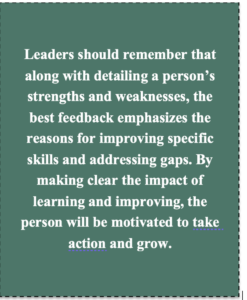The Finer Points of Feedback
In working with leaders on improving the feedback they give to their managers, I focus on ways they can bolster their positive feedback and approaches to help them handle difficult situations.
Most leaders are good at articulating what their managers have done well, and by putting strengths and weaknesses in the context of their managers’ aspirations their feedback becomes more valuable. Leslie is a strong performer, standing head and shoulders above her peers. But she rarely helps her peers grow or contributes to their success. Her manager considered Leslie’s lack of support for her peers as a developmental issue because she would likely be promoted over her peers and become their manager. Without that context, Leslie might not understand the importance of investing in peer relationships. Instead of just citing an “area for improvement,” her manager provided developmental feedback that motivated Leslie to address the issue.
Sometimes staff have higher opinions of their performance than their boss. Kevin thought his performance was exceptional, and considering just his specific duties, he was definitely a star. But Kevin was not a team player: his colleagues could be drowning in work but when he finished his tasks, Kevin would leave. In this case, his manager needed to revise Kevin’s job description and performance metrics to reinforce the importance of teamwork. While Kevin’s manager praised his work, he made it clear that if others on the team couldn’t meet a deadline, the entire team failed, including Kevin.
A staff member who hears and accepts feedback but doesn’t change their behavior can be frustrating. I suggest that at the end of a performance conversation, the manager tells the person to reflect on the feedback and create a plan to address the development areas. This assignment gives the person time to absorb the feedback and take ownership for addressing the deficits. If the employee comes back with a good plan, the manager should offer support and encouragement. If the plan is lacking, the manager should point out areas that still need addressing and suggest possible steps.
The most challenging situations are when a staff member doesn’t accept the feedback and blames others for their poor performance or claims circumstances beyond their control kept them from doing a good job. The manager should ask what the person did to overcome those obstacles. If they have no answer, it should be pointed out that overcoming obstacles is part of their job. In almost any endeavor, we will encounter problems or setbacks; successful people face those challenges, find ways to overcome them, and in the process of doing so learn something new or develop an important skill. Dealing with difficulties is an opportunity to call on abilities that the person may not know they have and develop a new strength. While it can be painful at first, exercising muscles that have been neglected will make them stronger.





